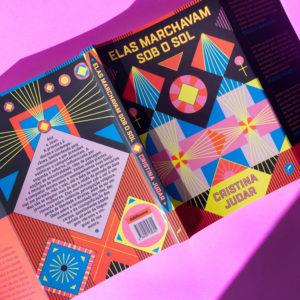(MENAFN- Brazil-Arab News Agency (ANBA))
São Paulo – A Jabuti Award finalist and São Paulo Prize for Literature laureate, Cristina Judar launched earlier this year her new novel. In Elas marchavam sob o sol [They marched under the sun], the author brings the perspectives of several narrators, particularly two young women, that draw a parallel between modern and ancestral and see their life stories getting closer and closer together.
These parallels might as well be inspired by the history of countries such as ancient and cosmopolitan Lebanon, where the paternal grandparents of the author came from. But the inspiration spanwed from the author's desire to tell more plural stories.
Elas marchavam sob o sol
Although she hasn't depicted her own personal experience in the book, the author believes in the importance of preserving and restoring ancient cultures.“It's a work of fiction, so it doesn't put forward my own life story, but this is all part of it, of course. I believe it's important that every person works from their own ancestry. I try to respect that, even though I don't possess a thorough knowledge on the women that came before me. I've lost many stories because I had no contact with those people, but I believe that honoring their existence is worth something,” she says.

Judar is a granddaughter of Lebanese grandparents
The novel was published by publishing house Dublinense and details the perspectives of many narrators to bring diversity and energy. Judar intended to create multiple points of view.“It's both challenging and exciting to try and create several voices that goes hand in hand in order to build a whole narrative. I needed many voices to get what I was looking for. Each and every one of them enhanced the story. It's like sewing, weaving – there're several threads that come together to form a bigger picture,” she said.
Through her two main characters, Ana and Joan, who experience the months leading up to their 18th birthday, the author brings light to issues such as gender oppression.“It's a march for freedom, for claiming their rights – this passage means a great deal for the whole novel. It's an image of a march that everyone can see in broad daylight. It's something that has to be clear. And it's a journey together, even if it's at a different rate for each of them. So they marched, and they will keep marching,” Judar stresses.
Arab ancestry
In the author's life, the ties to the Arab culture came mainly in her childhood.“My father was the son of Lebanese parents, and some of his brothers were even born there [in Lebanon], but he was the youngest and was born in Brazil.“I met my paternal grandmother, but because of the generation gap, I ended up having little contact. But the Arab culture and cuisine have always been part of my life,” the author says.
You may also enjoy reading:
- Brazil publishing house participates in Book Fair in Qatar
- Project translates Arab literature classic into Portuguese

In Elas marchavam sob o sol, the author brings the voices of multiple narrators, particularly young women Ana and Joan.
The memories of her family are mainly of a relaxed atmosphere.“It was a very lively family. They have always been party people, which is a nice legacy. People with a passion for life,” she describes. Besides Cristina, her sister Tania Judar has also followed the path of literature, but in children's genres.“We both write, but each one in their own field,” the author points out. She left her career as journalist to become a writer, and since 2009 she has published works from short stories to graphic novels and novels.
Now Judar works in the post-launch phase to promote her new work. While she hasn't had any of her books published in the Arab countries, she said that the translation of some of her texts have caught her by surprise.“Some of my texts, short stories, have been translated into Arabic. I learned the news by chance. I was surprised. One day a picture of me came up in a page in Arabic, and I didn't know what it was. I started searching and eventually got to another Brazilian author, Leila Teixeira, who told me a translator found our texts in English and then translated them into Arabic,” she said.
Her complete works haven't reached the Arab countries, though.“I still don't have any contact with publishing houses from there. I'd love to know how I can have this experience [to have a book translated into Arabic]. It would be very exciting to go to some book fair in the Arab countries,” the author said.
Translated by Guilherme Miranda
Thais Sousa/ANBA
Supplied
Supplied
The post New novel by Cristina Judar have multiple narrators appeared first on Agência de Notícias Brasil-Árabe .
MENAFN27072021000213011057ID1102521221
Legal Disclaimer:
MENAFN provides the information “as is” without warranty of any kind. We do not accept any responsibility or liability for the accuracy, content, images, videos, licenses, completeness, legality, or reliability of the information contained in this article. If you have any complaints or copyright issues related to this article, kindly contact the provider above.